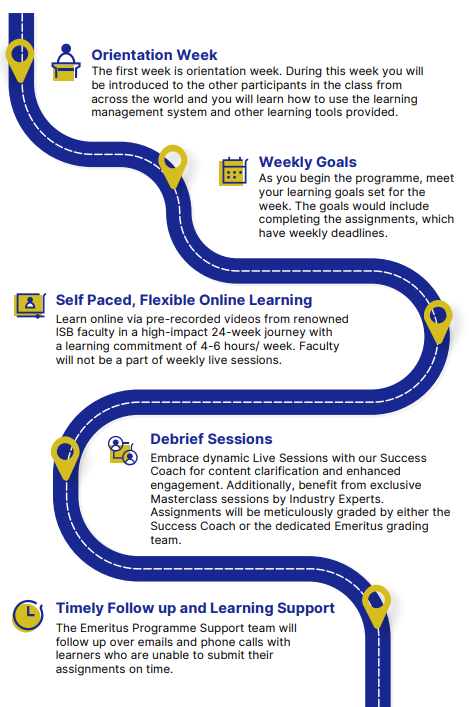The ISB CTO Program -- full name Indian School of Business (ISB) Chief Technology Officer (CTO) Programme -- is a 24-week executive education initiative crafted for senior IT leaders and technology professionals with at least 10 years of experience.
Its primary aim is to equip current and aspiring CTOs with the strategic, technical, and leadership skills required to drive technology-led transformation and innovation in modern organizations.
The program blends online learning, live faculty sessions, industry masterclasses, and an in-person campus immersion, culminating in a capstone project and ISB certification (requires achieving a 70% score).
Upon successful graduation, besides an ISB Executive Education certificate, participants also earn an Executive Alumni status, gaining access to a peer network, ongoing learning resources, and exclusive events.
The faculty consists of four lecturers. Three of them have purely academic backgrounds, while one has extensive C-suite experience. Other experienced technology leaders appear on a few occasions (2-3 sessions).
In comparison, CTO Academy organizes weekly live sessions that range from CTO Shadowing and Expert Q&As to Peer-to-Peer sessions. So, if you are looking for immediately applicable solutions to daily challenges of the CTO role delivered by active practitioners, the ISB CTO Program might not be the best option, even if you work in the APAC region.
Another factor to consider is the price. As you will see, it is much higher than CTO Academy's Digital MBA for Technology Leaders, for instance (85% more expensive to be precise).
However, if you are solely looking for a prestigious certificate on the APAC market for your resume, prefer an academic style of teaching, and have a sufficient budget, then continue through this review to find out more about this program.


1. Strategic Leadership and Innovation
CTO role and competencies
CTO vs. CIO responsibilities
Digital economy drivers
Digital ecosystems and strategy
Innovation management, digital business models, and portfolio management
2. Technology Architecture and Development
CTO as technology architect
Technology selection and platform building
Emerging technologies: AI, generative AI, blockchain, IoT, AR/VR, metaverse
Product development strategies and customer-centricity
3. Technology Management and Governance
Assessment of emerging technologies
Cybersecurity and tech law (India vs. global)
IT governance frameworks
Digitisation, analytics, and digital supply chains
Financial management for CTOs
4. Organisational Leadership and Communication
Digital transformation execution
Change management and resistance
Team building, coaching, leadership in disruption and crisis
Strategic communication and storytelling for tech leaders
Capstone Project
Real-world application of program learning to a strategic technology challenge
Vallabh Sambamurthy, Dean, Wisconsin School of Business (Visiting Faculty, ISB)
Subodha Kumar, Professor, Fox School of Business (Visiting Faculty, ISB)
Kannan Srikanth, Associate Professor, Fisher College of Business, Ohio State University (Visiting Faculty, ISB)
Nandu Nandkishore, Adjunct Professor, ISB; ex-global C-suite executive
If you are applying for a role in the India/APAC market, there is a good chance that the employer will favor an ISB certificate because of the school's regional prestige.
One notable thing that participants consistently cite is the program’s impact on their strategic thinking, leadership confidence, and ability to drive innovation. Many highlight the value of the peer network and the transformation in their approach to problem-solving and team leadership.
But again, this mostly refers to the APAC and India markets because the bulk of the alumni live and work in that part of the world. Thanks to this expanded professional network and industry credibility, you might gain a competitive advantage.
The ISB CTO Program offers a robust, interdisciplinary curriculum that blends strategic leadership, innovation, and advanced technology topics, making it a strong choice for senior technology professionals aiming to drive digital transformation and business growth.
Its strengths include hands-on learning through real-world projects, access to an executive alumni network, and a flexible hybrid format that accommodates working professionals.
However, like any advanced executive program, it comes with challenges such as a significant time commitment, a competitive admissions process, and a high fee relative to some online alternatives.
While ISB’s regional prestige and industry connections are major assets, candidates seeking global brand recognition or more extensive in-person immersion may find other top international programs a better fit for their specific needs.
Overall, the ISB CTO Program stands out for its comprehensive approach and practical relevance, but you should definitely weigh its demands and regional focus against your personal career goals and circumstances.